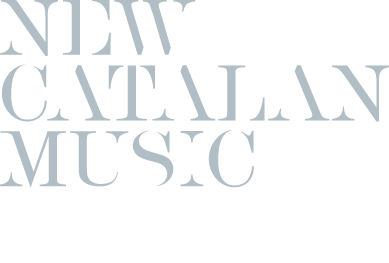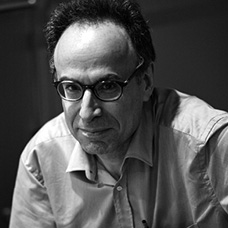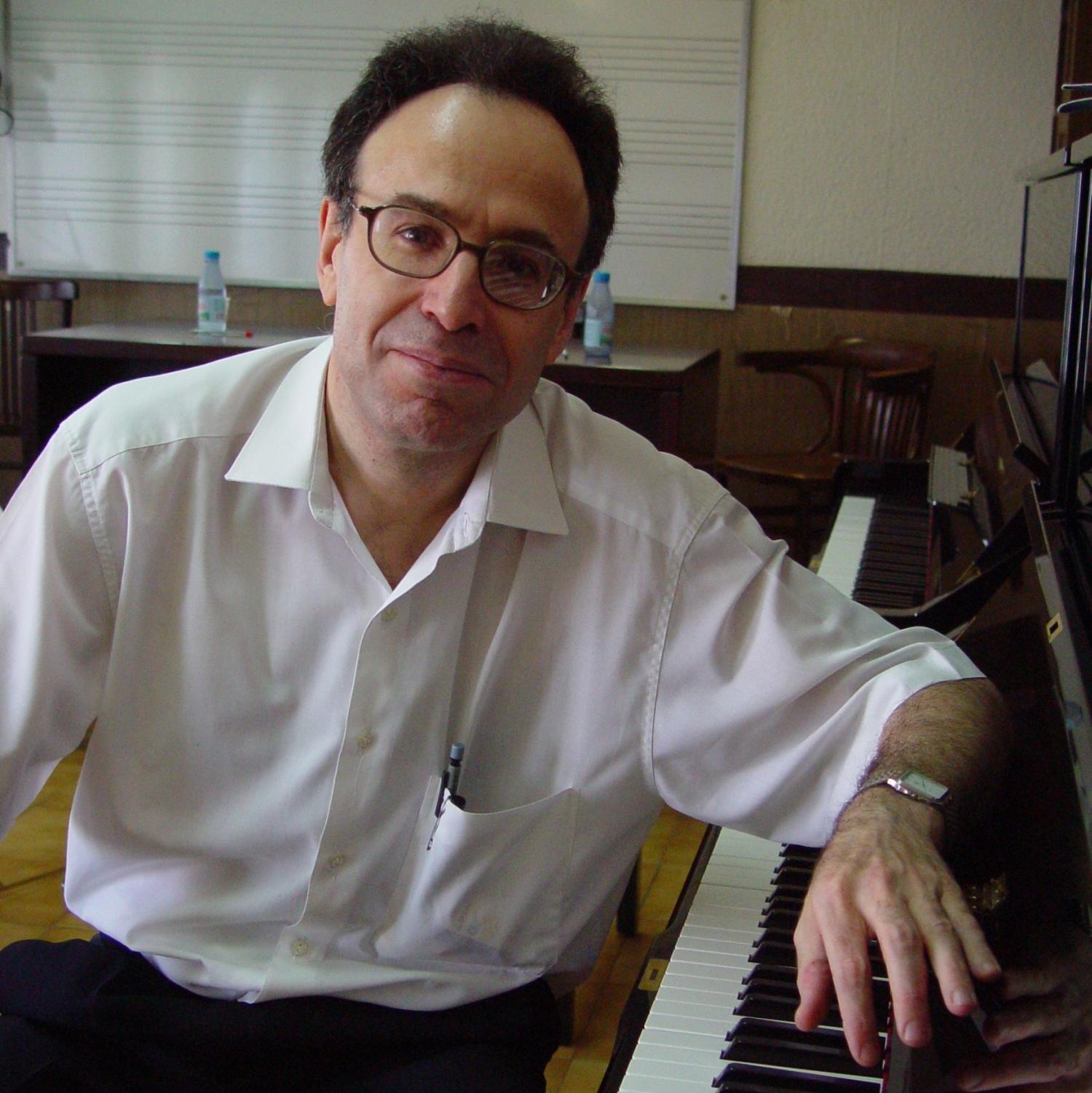Benet Casablancas
Contemporary music
(Benet Casablancas, Sabadell 1956)
Composer, musicologist and pedagogue, he was trained in Barcelona and also in Viena, where he worked with Friedrich Cerha. He graduated with an undergraduate degree in Philosophy from the Universitat Autònoma de Barcelona, where he later went on to receive his PhD in Musicology. In 2002, he was named Director of the Conservatori Superior de Música del Liceu.
The collection Epigramas figures among his most well-known works as it seduces with its refined writing, its expressive force and its orchestral command. Where these characteristics reach their maximum intensity is in Tres epigramas para orquesta (2001), premiered that same year by Orquestra Simfònica de Barcelona i Nacional de Catalunya (OBC). The thoroughness and balance of Tres peces per a piano (1986), the search for new textures and harmonic formations that characterize his Scherzo per a piano (2000) or the fascinating tone of Petita música nocturna (1992) for flute, clarinet, percussion, harp and piano, are eloquent signs of a meaningful evolution in his language towards tonal passages of great expression and dramatic meaning. Here shines an instrumental writing of great virtuosity and a command of the most diverse technical and artistic resources from the classical avant-gardes of the 20th century. Without renouncing a very demanding instrumental writing, his music has earned a huge communicative power over time. As an orchestra composer, the piece that most stands out is Cinc Cançons i Danses de Mompou (1979).
In 2006, in light of his 50th birthday, many rendered him homage, especially during the magnificent monograph concert that took place at the museum Reina Sofía de Madrid. In 2007, the Generalitat de Catalunya awarded him with the National Prize in Music. The recording Melancolías y desabrimientos. Aiguafort quixotesc per a contrabaix i piano, performed by Joan Collell i Jordi Masó and commissioned by the Fundació Caixa Catalunya in light of the exhibit Visions del Quixot, appeared in the first volume of the collection called Estrenes a La Pedrera.
On April 9, 2008, in honour of the series Spanien Modern, a monograph concert took place in the chamber room of the world famous Musikverein in Viena. There, his chamber pieces were performed by Grup Instrumental Barcelona 216, conducted by Manel Valdivieso, featuring the actor Carlos Hipólito as the narrator of Siete escenas de Hamlet. This last piece, the result of a confessed admiration for Shakespeare, and of which there are two versions (one for symphony and the other for a chamber orchestra) was premiered in1989 by the Orquestra de Cambra Teatre Lliure de Barcelona, and has been performed on more than twenty-five occasions in key European auditoriums, such as the Barbican in London, where the BBC Symphonic Orchestra, conducted by Josep Pons, presented and narrated it in English on October 24, 2008.
Two of his most internationally known pieces are Quartet n. 2, which Arditti Quartet has performed through Europa, and Alter Klang. Impromptu for orchestra (2007), based on the Paul Klee painting of the same name. Another example of his devotion to Shakespeare is The Dark Backward of Time, commissioned by the OBC and premiered in January 2006 with Ernest Martínez Izquierdo as the conductor. The Cantus Ensemble of Croatia performed New Epigrams in October 2008 at the Festival of the International Society of Contemporary Music, ISCM World Music Days 2008, which took place in Vilnius, Lithuania.
In 2010, the Royal Liverpool Philharmonic Orchestra commissioned Dove of Peace. Homage to Picasso (Chamber concert núm. 1 for clarinet and ensemble), to be performed by the Ensemble 10/10 on May 19 with the clarinettist Nicholas Cox –to whom it is dedicated to- as a soloist. This piece was also performed in 2011 at the closing concert of the Festival of the International Society of Contemporary Music celebrated in Zagreb (Croatia), where it was commissioned by Davorin Brozić, performed by the Ossian Ensemble of Canterbury, and conducted by Darren Bloom. Dove of Peace. Homage to Picasso represents a new perspective one of the constant traits in his work: the dialogue between artistic languages, particularly with painting. Its premiere in Spain took place in 2012 at the Auditorio 400 of the Museo Nacional Reina Sofía, with the performance by Joan Enric Lluna and the group Modus Novus, which was conducted by Santiago Serrate.
In the most prolific moment of his career (commissions multiply and his music is played at principal auditoriums in Viena, New York and London), Casablancas’ work reached great recognition with his recordings in 2010. With five monograph albums, he showcases his best symphonic and chamber creation, extremely rare in current times of crisis with the record industry. The label Naxos gave him two recordings: one of them symphonic, commissioned by the OBC and conducted by Salvador Mas, featuring the highly refined Tres epigramas (that Mas had premiered in 2001) and the ambitious The Dark Backward of Time, and the second recording dedicated to chamber music with important works like the collection Epigramas and the Siete escenas de Hamlet, performed by the group Barcelona 216 and conducted by Manel Valdivieso.
The Arditti Quartet recorded all of his string quartets, released on the Spanish label Tritó and meanwhile, the Italian Stradivarius proposed an attractive program that combined chamber pieces with symphonic works, performed by the Orquesta de la Comunidad de Madrid and its leader, José Ramón Encinar; one of them was the first world recording of Alter Klang and the first recording of the symphonic version of the Siete escenas de Hamlet. In addition, the Orquesta Nacional de España (ONE) and Josep Pons, dedicate to him a monograph including the first recording –interestingly enough, prior to its public premiere, conducted by Vladimir Jurowski on February 27, 2012 at the Palau de la Música Catalana de Barcelona– of Darkness Visible, nocturne for an orchestra, one of his definite milestones. The album also includes Tres epigramas and another recording of Alter Klang, a piece that the very ONE had commissioned to premiere in February 2007 and that constantly invites to new performances, including the first show in Barcelona in March 2012, done by the OBC under Pons’ magical baton.
Over the last three years, the works of Casablancas have been performed by groups such as the Filarmónica de Gran Canaria, National Youth Symphony Orchestra of the Netherlands, Malmö Symfoni Orkester, Orchestre National de Belgique, Orquesta de la RTVE, Contemporary Music Ensemble Oberlin, BBC Symphony Orchestra, Ensemble Nomade (Japó), Deutsches Kammerphilharmonie de Bremen and the Tokyo Sinfonietta.
More recently, there was a tour through Japan in December 2009 in collaboration with the Trio Kandinsky and which brought his music to Tokyo, Nagoya and Osaka. There is also the Composer Portraits, showcased with great success at the Miller Theatre of New York’s Columbia University in February 2010, which included the full premiere of Four Darks in Red, a work based on the Mark Rothko painting of the same name, commissioned by the Artistic Director of the Miller Theatre, George Steel. Finally, there was the debut in the United States of Seven Scenes from Hamlet, performed by the Perspectives Ensemble and the actor Chuck Cooper, under the Spanish conductor Ángel Gil-Ordóñez.
His most recent premiere has been Jubilus. Homage to Jordi Savall (2012), which took place in Paris and was performed by the pianist Diego Fernández Magdaleno, going on to other cities. Also recent is Dance, Song and Celebration (2012), part of «Homage to Catalonia: In Celebration of the Centenary of Xavier Monsalvatge» at the Auditorium of the Morgan Library and Museum of New York, performed by the Perspectives Ensemble and conducted by Gil-Ordóñez and Pastoral, performed by the Sax Ensemble, conducted by José Luis Temes, within the 28th Festival de Música Contemporània d’Alacant. Also, his music will be especially present during the 2013-14 and 2014-15 concert seasons at the Auditori de Barcelona, which will dedicate to him a “Portrait of an Artist”.
The next challenge for Benet Casablancas will probably mean a decisive artistic step in his career, as it entails what will be his first opera creation. Its working title is Io, with a libretto by the writer, poet and philosopher Rafael Argullol (Barcelona, 1949). It is commissioned by the Gran Teatre del Liceu and is expected to premiere in 2014-2015.
On top of his prolific musical creation, he is the author of numerous studies, notes in concert programs, and articles. He also works as a music critic for the newspaper La Vanguardia. Some of his essays include El humor en la música. Broma, parodia e ironía. Un ensayo (Reichenberger, Berlín, 2000) and La música catalana i les avantguardes europees (1916-1938), published by Publicacions de l’Abadia de Montserrat (Barcelona, 1999). He is currently working on Paisajes del romanticismo en música and Introducción al análisis formal. Principios y aplicaciones, to be published by Reichenberger. He is the coauthor (with Josep Casanovas) of the volume dedicated to Cristòfor Taltabull, within the collection Compositors Catalans published by the Departament de Cultura de la Generalitat de Catalunya (Barcelona, 1992).
Since 2012, he has been one of a select group of composers who publish their works under Music Sales, which is just another important step in his path to international recognition of his work. In November 2013 he was awarded by the Ministry of Culture with the National Music Award in the category of Composition. The jury highlighted "the maturity and creativity achieved in his music" and "the broad international distribution” of their work.





 twitter
twitter flickr
flickr facebook
facebook RSS
RSS spotify
spotify youtube
youtube
